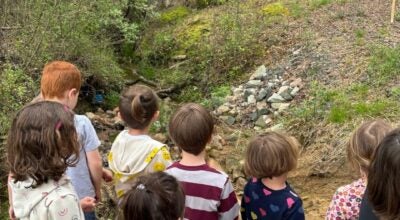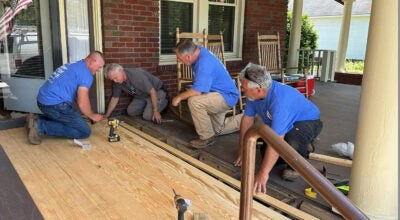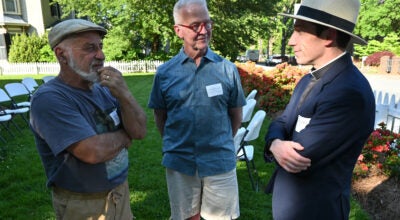Badin’s hopes hinge on new jobs at Alcoa site
Published 12:00 am Monday, March 28, 2011
Second of two-part series
By Karissa Minn
kminn@salisburypost.com
BADIN ó When Badin Mayor Jim Harrison begins to talk about his town, the floodgates open and he canít hold back.
Heís proud of Badin, the town where his parents met, where he was born and where he spent most of his life.
ěOnce, this was a boomtown,î Harrison said. ěIt had the largest theater from Richmond to Atlanta.î
He talks fondly of Alcoa, the company that was once the townís largest employer. Its workers made aluminum in a smelter by Badin Lake.
But the smelting plant, once powered by the Yadkin Hydroelectric Project, has not produced aluminum in nearly a decade. More than 300 jobs were lost when it closed in 2002.
Alcoa sells the electricity generated by the projectís four dams to utility companies, and it is trying to get a new license to continue to operate them.
Badin is now a quiet town of about 1,100 people, its history carefully preserved in two small museums. Most of those who are employed now drive elsewhere to work.
Harrison says the ěkey to our successî is getting new business into the town ó a goal Alcoa says it shares.
Cleanup work
The company is spending $10 million to clean up the Badin Works site, demolish some buildings and renovate those that remain.
Alcoa says it hopes to work with local officials to locate another industry at the facility, bringing jobs and revenue back to Badin and Stanly County.
ěOur goal over a three- to five-year time period is to have more jobs on the Badin site than when it shuttered,î said Alcoaís Chief Sustainability Officer, Kevin Anton.
Alcoa representatives say they have been talking with interested companies since the Badin Works plant shut down in 2002, but the aging facility didnít meet their needs.
ěIt was in March of 2010 that we made the decision that this was no longer going to be a smelter site,î Anton said. ěPerhaps we held out hope a little too long.î
Alcoa now plans to demolish several buildings that only a smelter would use and preparing the few that remain for other uses. The company is in the process of clearing out old equipment ó giving some to its other operations, selling what it can and scrapping the rest.
Anton said interest in the site has picked up in the past three months.
ěWeíve got four or five fairly active people looking at parts of the site,î Anton said. ěI think it would be good for the community if we can bring in two or three significant employers that operate in different business segments.î
After all, this community has seen what can happen when it depends on one employer to survive.
Shared growth
The town of Badin once made aluminum, and it was aluminum that made the town.
A French company called LíAluminum Francais began work on a dam and smelting operation on the Yadkin, but the outbreak of World War I caused construction to halt.
After that company left, Alcoa took over the smelting operation in 1914. It built four dams to power it between 1917 and 1962.
Until its incorporation in 1990, Badin was a company town. Alcoa built it according to the French ěgarden cityî plans, and as the Alcoaís workforce grew, so did Badin.
The company built houses, schools and churches and provided police and fire service for the town.
Harrison worked 31 years with Alcoa before retiring. He started out in the potroom before moving to the machine shop and then to purchasing.
When it first started up, the company employed around 3,000 people in high-paying jobs. When it received its first license in 1958, Alcoa still employed about 1,000, but the workforce and the townís population dwindled over the next several decades.
Industry became automated, commuting grew easier and jobs began to move overseas. By 2002, the mid-century technology at Badin Works could not compete with newer, larger smelting operations, so Alcoa shut the plant down.
ěI canít turn my back on a friend because heís down and not making money right now,î Harrison said. ěAlcoa has been a good corporate citizen.î
Hope survives
The mayor said he trusts the company to help revitalize the townís economy by bringing new business in. Harrison recently met with representatives from a company seriously considering the site.
ěThey love the power capacity, theyíre impressed with the infrastructure and theyíre impressed Alcoa still owns 11 miles of railway,î he said.
Alcoa plans to keep the four 1,200-foot-long, 65-foot-wide parallel buildings where potroom workers made aluminum in sweltering heat. Temperatures often reached 120 degrees near the smelting equipment.
Alumina was extracted from bauxite ore under heat and pressure, then suspended in pots of molten cryolite at nearly 1,800 degrees. An electric current would separate out the molten aluminum, which was transported to another building to be cast into ingots or other products.
Site amenities
Now, the massive warehouse-style buildings and long concrete pot trenches will soon be empty. Alcoa representatives say the rare structures are well-suited to assembly-line manufacturing and heavy industry.
Other buildings on the site feature industrial-capacity cranes and other specialty equipment.
In terms of infrastructure, said Stanly County Manager Andy Lucas, the Badin Works site is one of the best available for industry in the area and even the state. It has access to low-cost energy, dual-service rail, natural gas and high-capacity water and sewer.
ěThe site that has lot of attractive features, but one thing it doesnít have is a clean bill of health,î Lucas said. ěThe problems we have are with environmental legacy concerns.î
Representatives from the N.C. Department of Environment and Natural Resources and the Department of Commerce are working to address those concerns as they arise, Harrison said.
Cyanide, arsenic, PCBs and other toxic contaminants have been found in soil and groundwater at or near the site.
The mayor said he knows damage has been done but says Alcoa has complied with state and federal environmental officialsí instructions to mitigate it.
ěWe pay DENR to be our watchdog,î Harrison said. ěIf they say Alcoa should clean it up, they should clean it up. Right now, I understand theyíre within their limitations.î
He said most of the pollution took place before anyone realized how bad it was.
ěMy father and my wifeís father worked for them then,î he said. ěThey didnít know what they had.î
Stanly County Commissioner Tony Dennis also grew up in the area and had relatives who worked for Alcoa. He says Alcoa may not have known what it was doing then, but it isnít doing what it should be now.
ěThey claim theyíve cleaned up the site, but they havenít and theyíre not going to,î Dennis said. ěWhoís going to come over on that polluted site?î
Shared future
Stanly County officials like Dennis and Lucas are fighting against Alcoaís relicensing, but Harrison said the town will be better off if Alcoa stays.
As part of the relicensing settlement agreement, Alcoa has pledged to donate 14 acres to the town for a new public park along Badin Lake. If the new license is approved by FERC, the City of Albemarle will be allowed to increase its water consumption by four times ó up to 30 million gallons per day.
The company also has agreed to donate about 1,000 acres of land to expand Morrow Mountain State Park, allowing Badin to have an access point.
He said he doesnít know what will happen to that land if Alcoa leaves the area. The state could purchase it along with the dams in a takeover of the project, but Harrison doubts it would follow the companyís intentions.
ěAlcoaís land is pristine and beautiful,î Harrison said. ěThatís the way we want to keep it.î
Contact reporter Karissa Minn at 704-797-4222.




